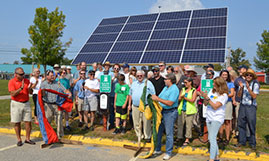2021 Measures of Growth Report Calls for Innovative Responses to the Ongoing Pandemic and Signals Strategies to ensure a Sustained, Inclusive Recovery
Hallowell, Maine – December 15, 2021 – The nonpartisan Maine Economic Growth Council today released its 27th annual Measures of Growth Report, a comprehensive snapshot of how the state’s economy is performing relative to our long-term goals, to other states, and the U.S. The Report highlights factors shaping the experience of Mainers during this extraordinary time and their impact on our economy. It also points to both reasons for optimism and critical areas of focus to ensure a robust, inclusive recovery.
“This Report provides critical insight into Maine’s economy,” says Steve Von Vogt, Chair of the Maine Economic Growth Council. “We continue to harness Yankee ingenuity, the power of science, innovation, and public-private partnerships to respond to the challenges posed by COVID. Maine business, community, and non-profit leaders of all races and ethnicities continue to join forces privately and publicly to eradicate systemic inequities and build a truly diverse, equitable, and inclusive economy so together Mainers can recover and prosper.”
In total, the 2021 Measures of Growth Report tracks 30 indicators that represent Maine’s assets and areas of challenge. To better reflect current circumstances, the report has a new measure: Greenhouse Gas Emissions, which acknowledges thegrowing impact of climate change on our environment and economy. In addition, we have updated four other indicators to better track critical forces: Broadband Connectivity uses a new data set to track access to high-speed service; Postsecondary Degrees & Credentials now includes valuable non-degree certifications; Entrepreneurship now measures how/if start-ups outpace closures; and Labor Force Participation better tracks in which industries and sectors Mainers are working in – or leaving.
The Council assigns Gold Stars for significant progress in:
- Prekindergarten Education – In 2020-2021, the share of schools with a pre-K program continued to increase and is now 79%
- Safety – Maine’s crime rate dropped another 7% in 2020 and is now 46% below the national average – the second lowest in the nation.
- Water Quality – The water quality of Maine rivers and streams remains far above the U.S. average.
The Council assigns Red Flags for needed attention to:
- Labor Force – In 2020, Maine’s labor force shrank 3% (20,000 fewer working-age people).
- Research and Development Expenditures – In 2018, R & D spending in Maine represented only 0.8% of total gross domestic product (GDP), compared to 2.8% nationwide. This ranks Maine 43rd of the 50 states.
- Broadband Connectivity – COVID highlighted the need for high-speed internet but new data show just 18% of Maine locations have access to truly high-speed service (100 Mbps/100 Mbps).
- Housing Affordability – In 2020, Maine’s housing affordability index fell 4%. Homeownership costs met or exceeded the affordability threshold in just six of Maine’s 16 counties, and only one county, Franklin, had affordable rental housing.
“The Measures of Growth annual report has long provided valuable information about what we are doing right, where we need to improve, and the trends of progress or decline over time,” says Yellow Light Breen, MDF’s President and CEO. “These indicators reinforce that talent, innovation, and infrastructure must be the focus for strategic investment – while also maintaining public health, a clean environment, and vibrant communities. We look forward to the opportunity to work with policymakers, businesses, and community leaders to stabilize, diversify, and rebuild a Maine economy that is inclusive and sustainable.”
The Maine Economic Growth Council takes a nonpartisan, data-driven approach to presenting an unbiased picture of Maine’s economy and well-being. Measures of Growth is designed to be a resource for policy and decision makers at all levels, helping them to focus their efforts and understand the connections between the key issues affecting the state. Th Council is administered by the Maine Development Foundation (MDF). Council members are jointly appointed by the Governor, Senate President, and Speaker of the House, and represent a broad and diverse cross-section of Maine’s key constituencies.







